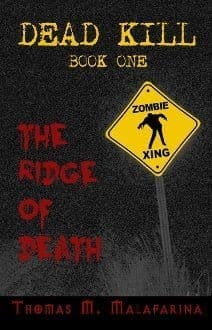Guest Post: The Differences Between Writing A Novel Vs A Short Story
 The Differences Between Writing A Novel Vs A Short Story
The Differences Between Writing A Novel Vs A Short Story
By Thomas M. Malafarina
Often people ask which I like best, writing a complete novel or writing a short story. The answer I give is always a resounding albeit annoying “yes”. I enjoy both equally and write both not only regularly but also simultaneously.
At any point in time, you will find me working on a novel (or two). And, while doing so I find myself often needing a break to give myself a chance to step back and reexamine the progress of the work. I’ve found the best way to do that; and to keep from becoming bored or frustrated with the rigors of novel writing, is to write short stories. It is also a great way to avoid the dreaded “writer’s block.”
There is an additional benefit in doing this in that I usually write enough short stories during the course of writing a novel to come out with a nice short story collection in between novels. The result is a progression in my books releases, which over the past five years has been a novel, followed by a short story collection, followed by a novel and so on.
There are significant differences between writing a novel and a short story however. The most obvious difference is size or word count. Another is the amount of time it takes to write one verses the other. For me, a critical distinction between the two is character development, scene description/scene painting and story-line/plot development.
In a short story, time is tight and therefore so must be the writing. There is little time for background and character development. In as few words as possible, you have to paint a picture of the pertinent characters so the reader can see them clearly in their minds. I suspect this may be why a sometimes characters in short stories tend to be stereotypical such as a bully, a wimp, a trashy woman a hard-nosed gumshoe detective and so on. It is the quickest way to get from point A to point B. If your character has easily recognizable traits it saves a lot of time and space.
Likewise, short stories don’t have the luxury of complex story lines such as various characters having interacted during past relationships; at least not in any detail. Nor can a variety of seemingly unrelated characters have their own individual stories, which slowly merge to some distinct point in the future of the work, as you can do with a novel. In addition, it’s difficult to paint scenes in detail within the confines of a short story. As with the other factors you have to show the reader what you need him to see quickly and stick to the story. You have to keep things constantly moving.
In a novel, you can go into as much history and back story for character as well as story development as you feel necessary providing you don’t put your reader to sleep. You can also paint a detailed scene for the reader to enjoy and you can have several apparently unrelated stories all coming together at some point later in the novel. There is a lot more room for fluff in a novel than in a short story, which can also pose a danger in terms of creating boredom. By the way, a good exercise in writing tightly is to do some flash fiction. In such a work, you generally have to tell the entire story in five hundred words or less.
One might argue that almost any short story has the ability to eventually become a novel. This may or may not be true. Although there might be some merit to this belief, the question, which I would ask is should it be? Just because something can be done, doesn’t mean it should be done. That is to say unless there really is enough of a story for a novel. It always comes down to the story for me.
Here’s an example that comes to mind. Anyone who knows me is aware that I often note the parallels between the film industry and story writing. That is largely because when I am writing a story, I am seeing a movie played out in my mind. As an avid movie fan, I know the importance of painting a scene, providing a good story and holding the audience’s interest. One thing I have seen often in the film industry is how producers will take a single concept and will pull and twist it eventually forcing it into a full-length movie. Force is the operative word here.
More often than not the original concept is too weak to merit such an expansion and the result can feel forced and ends up being boring. This is a major mistake, which I see occurring far too often. How many times have you sat through a ninety minute or two-hour movie and complained that it should have been about ten minutes long? Conversely, how often have you seen a two-hour movie that flew by so fast the two hours didn’t seem long enough? My guess would be more often than not the first scenario is the most common.
The same principal applies to short stories verses novels. We live in a very fast-paced world. This can sometimes be a challenge for me in novel writing. People want the quick-hit, the fast zingers, the thrills and chills but all within a short amount of time. This works fairly well in short story writing but can be a major impairment in writing a novel. The challenge for the author is to hold the reader’s attention while still being able to tell his story in the way he chooses.
Personally, I am from the old school of thought where a novel is to be something to be savored, something to help the reader relax and which will take him away to a world separate and much different from the one in which he lives. For people like me, reading a novel is not a chore, it is a form of relaxation and escapism much like a good movie. (There’s that movie parallel again). But for many of the younger generation who have been raised on a diet of video games, fast-paced movies and the like, this concept may seem a bit foreign. For these folks, the short story or flash fiction is more to their liking. I’m not saying one school of thought is right and the other is wrong; it’s just the reality. As I often say, “You can choose to believe in gravity or not but if you jump off the top of a tall building you’re still a dead man.”
So for me there lies the challenge. When writing a short story I need to constantly find ways to provide enough background and color while telling the story and entertaining the reader. In novel writing, while providing character development, back stories and scene painting I need to constantly find ways to keep the reader entertained and turning pages. When interviewed I have often stated that the greatest gift a reader can give to an author is not the money he has spent for the book, but the time he is investing in actually reading the story.
About Thomas M. Malafarina
 Thomas M. Malafarina (www.ThomasMMalafarina.com) is an author of horror fiction from Berks County, Pennsylvania. To date he has published five horror novels “Ninety-Nine Souls”, “Burn Phone”, “Eye Contact” , “Fallen Stones” and “Dead Kill – Book 1 – The Ridge of Death”, as well as five collections of horror short stories; “Thirteen Nasty Endings”, “Gallery Of Horror”, “Malafarina Maleficarum Vol. 1”, Malafarina Maleficarum Vol. 2”, “Ghost Shadows” and most recently “Undead Living”. He has also published a book of often strange single panel cartoons called “Yes I Smelled It Too; Cartoons For The Slightly Off Center”. All of his books have been published through Sunbury Press.(www.Sunburypress.com).
Thomas M. Malafarina (www.ThomasMMalafarina.com) is an author of horror fiction from Berks County, Pennsylvania. To date he has published five horror novels “Ninety-Nine Souls”, “Burn Phone”, “Eye Contact” , “Fallen Stones” and “Dead Kill – Book 1 – The Ridge of Death”, as well as five collections of horror short stories; “Thirteen Nasty Endings”, “Gallery Of Horror”, “Malafarina Maleficarum Vol. 1”, Malafarina Maleficarum Vol. 2”, “Ghost Shadows” and most recently “Undead Living”. He has also published a book of often strange single panel cartoons called “Yes I Smelled It Too; Cartoons For The Slightly Off Center”. All of his books have been published through Sunbury Press.(www.Sunburypress.com).
In addition, many of Thomas’s works have appeared in dozens of short story Anthologies and e-magazines. Some have also been produced and presented for internet podcasts as well. Thomas is best known for the twists and surprises in his stories and his descriptive often gory passages have given him the reputation of being one who paints with words. Thomas is also an artist, musician, singer and songwriter.
LINKS:
Web: www.ThomasMMalafarina.com
Facebook: https://www.facebook.com/Thomas.M.Malafarina.AuthorOfHorror
Sunbury Press Web: http://www.sunburypressstore.com/Thomas-M-Malafarina_c52.htm?page=all
Amazon: http://www.amazon.com/Thomas-M-Malafarina/e/B003VUT1H4












I’ve been successful with short stories over the past few years, but struggle to write longer-form fiction. I’m still working on it, and I have no doubt I’ll get there some day. But right now, I’m enjoying shorts, and my writing is solidly about all those short fiction structures and styles. Thanks for an insightful post.
Angeline,
Glad you enjoyed the post. I hope it was helpful and best of luck in your future writing endeavors.
Tom
New writer here. I got the bug to write about Zombies this summer, and initially I was consumed with an idea for a book. It spilled out over nearly 100 pages before I had to take a breather and regroup. During that breather I started writing short stories to flesh out the background of the some of the characters I had created. I found immediately that I enjoyed the shorter format, but I also realized that the short stories were helping me flesh out my larger world. I’m hoping these “short zingers” will help keep me inspired to finish my book project, while giving the book enough backstory to keep a reader interested over 200 pages.
The short story vs. novel dichotomy seems obvious, but I’ve found them to be mutually supportive at the beginning of my writing career. If you can tell a compelling story in 500 words do it, then try 3000, then go big.
Thanks for the article.
Thanks for the comment Brian. Short stories are a great way to break of the novel writing process and ward off the dreaded “writers block”. My personal opinion is there is no such thing as writers block. What happens is people get so bogged down on finishing the work they started that they feel they can’t move on until it’s done. But they can’t figure out the rest of the book either. There is the mental road block. I say when a novel begins to feel forced or your ideas are slowing down, put the novel down and write something else, anything else. Give it time and come back with a new fresh outlook. At least that works for me.